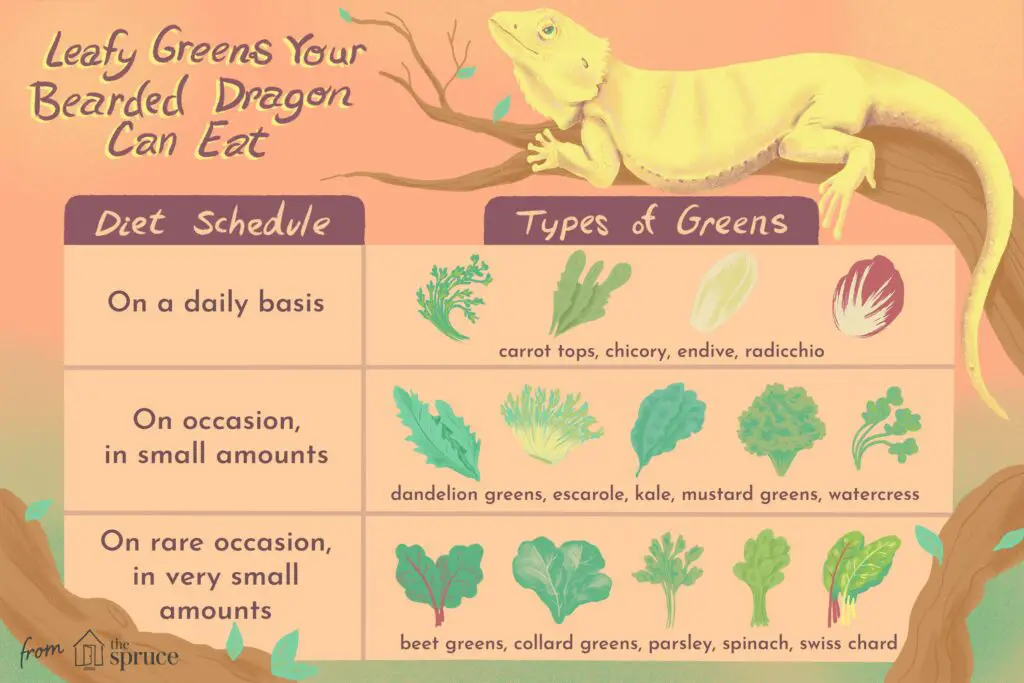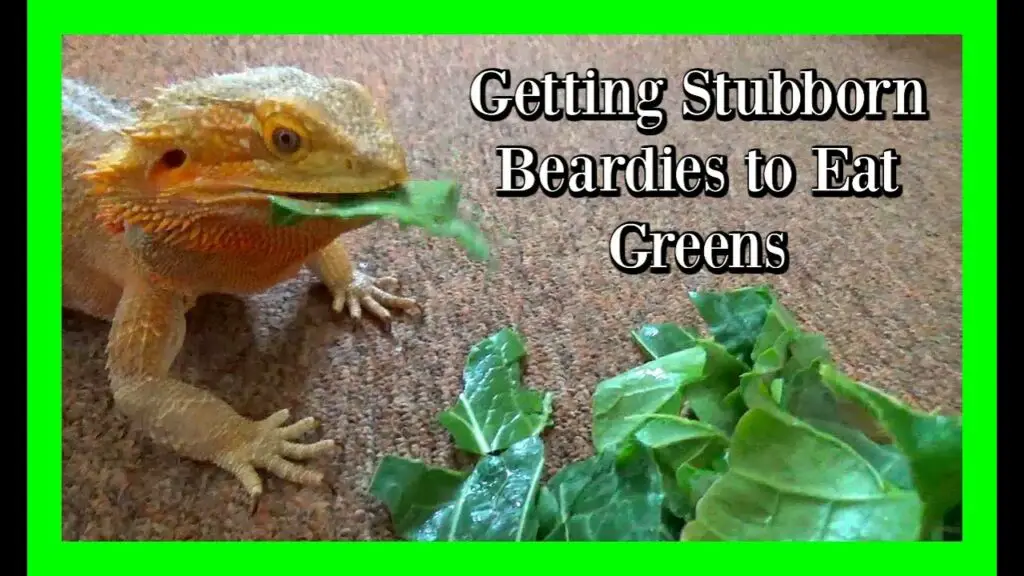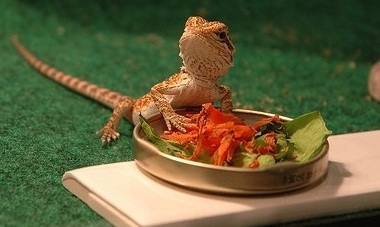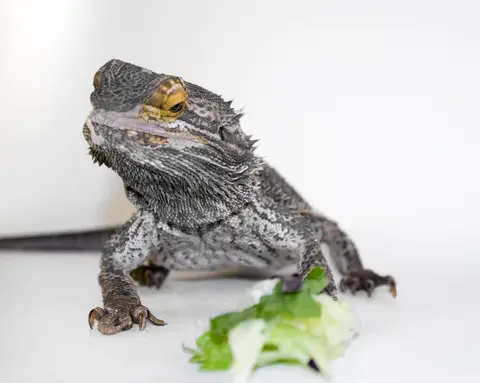Bearded dragons are fascinating reptiles known for their unique appearance and captivating personalities. As reptile enthusiasts, we understand the importance of providing a well-balanced diet for these magnificent creatures. While bearded dragons primarily consume insects, it is essential to incorporate greens into their diet to ensure optimal health and nutrition.

This image is property of www.thesprucepets.com.
In this guide, we will explore effective methods to entice your bearded dragon to eat greens. We will discuss the importance of a varied diet, the benefits of greens, and offer practical tips to encourage your pet to embrace these nutritious leafy delights.
By following these steps, you can provide your bearded dragon with a wholesome diet that supports their overall well-being.
Here are some tips to entice a bearded dragon to eat greens:
- Add Wax Worms or Small Mealworms: You can try adding wax worms or small mealworms on top of the mixed vegetables to get your bearded dragon to eat more vegetables.
- Add Bee Pollen: Adding a pinch of bee pollen to their salad can also help.
- Tempting Through Flavors: Try tempting your bearded dragon through flavors. You can try adding different flavors to the greens, such as a small amount of fruit juice or pureed fruit.
- Cut the Food into Finer Pieces: Cutting the food into finer pieces can also help make it more appealing to your bearded dragon.
- Create Movement, Wriggling Salads: Creating movement in the greens can also help. You can try making wriggling salads by adding live insects to the greens.
- Introduce Gradually: Greens can be an acquired taste, so one of the best ways to introduce your bearded dragon is by keeping a bowl of fresh salad (finely chopped) in the enclosure at all times.
- Mix it Up: Convince your bearded dragon to eat more by mixing it up. You can make a smoothie in your food processor or add small quantities of fruit or bee pollen.

This image is property of i.ytimg.com.
Benefits of Including Greens in a Bearded Dragon’s Diet
Including greens in a bearded dragon’s diet is essential for their overall health and well-being. Greens provide important vitamins, minerals, and fiber that are necessary for proper digestion and nutrient absorption. Here are some key benefits of feeding your bearded dragon greens:
- Nutritional Value: Greens are rich in essential nutrients such as calcium, vitamin A, and vitamin C, which are crucial for maintaining strong bones, promoting healthy eyesight, and boosting the immune system. These nutrients are essential for a bearded dragon’s growth and vitality.
- Hydration: Many greens, such as lettuce and cucumber, have a high water content, which can help keep your bearded dragon hydrated. Proper hydration is essential for maintaining healthy organ function and preventing dehydration.
- Digestive Health: The high fiber content in greens helps promote a healthy digestive system in bearded dragons. Fiber aids in proper digestion and helps prevent constipation, which is a common issue in these reptiles.
- Weight Management: Feeding your bearded dragon a diet that includes greens can help maintain a healthy weight. Greens are low in calories and fat, making them an excellent addition to the diet for bearded dragons that are overweight or prone to obesity.
- Variety: Including a variety of greens in your bearded dragon’s diet can help prevent boredom and ensure they receive a wide range of nutrients. Bearded dragons, like humans, benefit from a diverse diet that includes different types of greens.
Ways to Entice Bearded Dragons to Eat Greens

This image is property of reptile.guide.
While greens are an important part of a bearded dragon’s diet, not all dragons readily consume them. Some bearded dragons may be reluctant to eat greens or may have specific preferences. Here are some ways to entice your bearded dragon to eat greens:
- Mix Greens with Favorite Foods: One effective method is to mix small pieces of greens with your bearded dragon’s favorite foods. This can include insects such as crickets or mealworms, which are commonly included in their diet. The scent and taste of the insects can help make the greens more appealing.
- Provide Fresh and Varied Greens: Ensure that you offer fresh greens to your bearded dragon regularly. Bearded dragons are more likely to eat greens that are crisp and vibrant in color. Additionally, try offering different types of greens to provide variety and cater to their preferences.
- Chop Greens into Bite-Sized Pieces: Bearded dragons have small mouths and may struggle to eat large pieces of greens. Chop the greens into smaller, bite-sized pieces to make it easier for your dragon to consume them. This can also help to mimic the size of food they would eat in the wild.
- Introduce Greens from an Early Age: Start introducing greens to your bearded dragon’s diet as early as possible. Young dragons are more receptive to new foods, and establishing good eating habits early on can increase the likelihood of them accepting and enjoying greens.
- Experiment with Different Preparation Methods: Some bearded dragons may prefer their greens cooked or slightly warmed, while others may prefer them raw. Experiment with different preparation methods, such as lightly steaming or sautéing the greens, to see what your dragon prefers.
- Patience and Persistence: Encouraging a bearded dragon to eat greens may require patience and persistence. Continue offering greens regularly and be consistent with your efforts. Some bearded dragons may take time to adjust to new foods, so don’t give up after a few attempts.
Tips for a Balanced Diet Plan for Bearded Dragons

This image is property of beardeddragonsworld.com.
In addition to greens, a balanced diet for a bearded dragon should include a variety of other food items to ensure they receive all the necessary nutrients. Here are some tips for creating a balanced diet plan for your bearded dragon:
- Insects: Insects such as crickets, mealworms, and dubia roaches should be the primary source of protein in a bearded dragon’s diet, especially for younger dragons. They should be offered in appropriate quantities and sizes, depending on the age and size of the dragon.
- Fruits: While fruits should only make up a small portion of a bearded dragon’s diet, they can be offered as occasional treats. Be sure to avoid fruits that are high in sugar, such as bananas or grapes, and opt for fruits with a high water content, such as melons or berries.
- Supplements: Bearded dragons require additional supplements to ensure they receive all the necessary vitamins and minerals. Calcium supplements, specifically with vitamin D3, are essential for proper bone growth and to prevent metabolic bone disease. Multivitamin supplements can also be used to ensure a well-rounded intake of nutrients.
- Water: Along with a balanced diet, providing clean, fresh water is important for a bearded dragon’s hydration. Bearded dragons typically do not drink water from a bowl, but instead, obtain moisture from their food. However, a shallow water dish should still be available for them to soak in and to help maintain hydration.
By incorporating a variety of greens, insects, and occasional fruits into their diet, and providing necessary supplements and hydration, you can ensure a well-balanced and nutritious diet for your bearded dragon.
Conclusion
Ensuring that your bearded dragon eats greens is essential for promoting their health and longevity. Greens provide vital nutrients, assist in digestion, and aid in weight management.
By following simple strategies such as mixing greens with favorite foods, offering fresh and varied greens, and being patient and persistent, you can entice your bearded dragon to incorporate greens into their diet.
Remember to create a balanced diet plan that includes a variety of other food items to provide all the necessary nutrients. By prioritizing a well-rounded diet, you can contribute to your bearded dragon’s overall well-being and ensure their long and healthy life.
